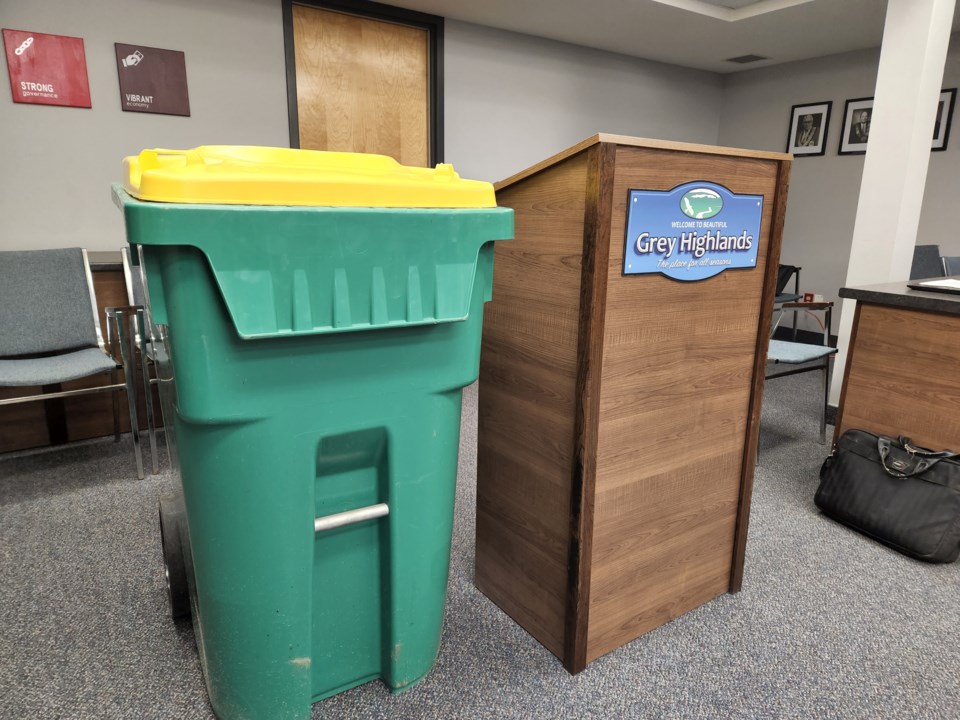Grey Highlands council has agreed to an alternative garbage collection system for local seasonal residents.
At its meeting on Oct. 4, Grey Highlands council approved an alternative garbage system for seasonal residents who are unable to make use of the new cart/bin collection system.
The municipality will now provide seasonal residents who prefer to opt out of the cart system with 52 custom garbage bags that can be brought to the municipality’s landfills for disposal.
Earlier this year, Grey Highlands switched from a traditional garbage/recycling collection system to the new cart system. One issue that continued to linger after the transition was the plight of seasonal residents who would not be home to utilize the cart system.
“They’re looking for an alternative option to drop off their waste given that they’re not always present at their residences,” said Coun. Nadia Dubyk.
Staff have spent several months doing some research into the issue and recommended going with custom bags that seasonal residents can bring to local landfill sites. Other options included: bag tags, a punch card system or an “opt-out” list.
Under the system recommended by staff and approved by council, residents preferring the custom bags would be required to return their garbage carts to the municipality. The base cost of the cart/bin collection system is calculated based on the total number of carts/bins at households.
“There’s nothing in between. You’re either in or out,” said Dubyk.
The custom bags will cost just over $17,500. The municipality will purchase 25,220 custom bags (that is the minimum order allowed) and estimate that 100 properties may opt out of the bins/carts.
Mayor Paul McQueen opposed the change. He suggested a bag tag system would be easier and more efficient.
“If they wish to take it on themselves and take it to the landfill, then we provide them with tags,” said McQueen.
The mayor also questioned the logistics of the change. He asked what happens if a property that opts out of carts is sold and the new owners want back in. He also questioned how those residents would receive the custom bags and said they would likely have to come to the municipal office.
“This is getting way out of whack,” said McQueen.
Coun. Paul Allen said regardless of the system – custom bags or bag tags – the carts would have to be returned to have them removed from the base cost and to avoid providing a double service.
“If they don’t return the carts, they can fill the carts and go to the landfill with the bags,” said Allen.
Shawn Moyer, director of environmental services, said if a property that opted out was sold and they wanted back in the cart system they would just need to contact the municipality and they would arrange for the carts to be delivered to the home.
McQueen asked for the matter to be deferred in order to hold a public meeting. The mayor moved to amend the resolution to defer until after a public meeting. However, his resolution was lost in a 4-3 vote. McQueen, Dubyk and Deputy Mayor Dane Nielsen favoured taking the concept to a public meeting.
Coun. Tom Allwood said council has already heard from the public on the collection system, particularly the issue for seasonal residents.
“That was really the only unresolved issue we had. This is a solution for them,” said Allwood. “Deferring just puts it off and those residents who are unsatisfied will continue to be unsatisfied until we solve this issue.”
Council approved the recommendation in a 5-2 vote with McQueen and Coun. Dan Wickens opposed.

.jpg;w=120;h=80;mode=crop)

